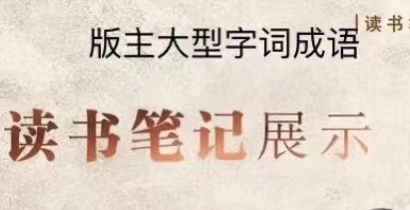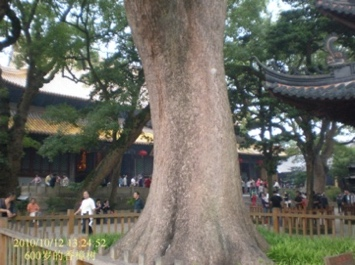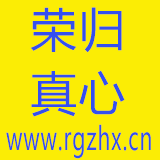In Section Forty-two “Hard Process of Publishing FBEC, Better Market than Expected” it was mentioned that in April of 2004 came an royalty of ¥15000, which made me very excited and think of turning my hope hidden in my heart for years into reality: travelling to Germany to see the people, cities, mountains, rivers and rurality there I got to know early in the years of studying German. German had been an emotion knot of mine for years, which could not be untied, esp. when we entered the 21st century, as China opened to the outside world to a greater and greater extent, the intercourses between China and Germany took place close to me. Every year there were students in CUMT going to study in colleges and universities of Germany. It was said that the students didn’t need to pay the tuition fee when they studied in Germany and they could earn some money to support their life in their spare time, which encouraged the enthusiasm of the students to go to Germany. My wife and I ran a small class to enroll some students to study German in my home. Seven candidates came and we taught German for the first time. I left the message online to the dean’s office of CUMT, saying that I was an English professor but I used to study German in Nanjing University and that I was willing to teach German if it was possible. My wish came true and I undertook a big class of 90 students, teaching them to study German, who came from varieties of departments and studied German as a second foreign language. As a result, I could give lessons only in the evening, two periods a week. I finally used German as if I returned to the situation 40 years ago. It was pity that I taught the class for only one term, not satisfying my craving. The teaching of German activated my appetite to go to Germany and the royalty I had received made the likelihood nearer. I didn’t know how much it would cost us. Meilan Zhang had been regarding being extravagant as shameful and thrift as glorious. It was very difficult for me to persuade her to follow me to go abroad. A writing task was just coming, which provided me with an excuse to go to German.
As mentioned above, Mr. Hongtao Li, an English teacher from CUMT, worked like an agent of the publishing house. He found me one day, telling me to design TOEIC exercises. I knew something about TOEFL (Test of English as Foreign Language) and knew nothing about TOEIC, whose full name was Test of English for International Communication. It was a vocational English test. Mr. Li gave some sample of the exercises and the listening comprehension exercises contained some photos, asking the students to answer the questions according to what was on the photo. The people on the photos had all kinds of colors, most of them being white people. If I went to Germany I would be able to take a lot of photos and get ready to design the listening comprehension exercises. On June 4, the agreement on writing two TOEIC exercise books was signed, asking me to turn in the manuscript before August 25. I had a lot of reasons to persuade wife to accompany me to go to Germany. The royalty received was enough to buy two round-trip air tickets, we could see some classmates of us and I could get material ready to write two new books. Eventually she agreed to pay a visit to West Europe together with me.
I knew nothing about how to go through formalities in order to go abroad, neither did I know to search for some information online. We had classmates who had been to German several times and they were willing to help us. I got touch with the pair, Youguang Sun (husband) and Fei Huang (wife). Sun had already become a German and Huang was there visiting her husband. Sun used to study in the small class with me in Nanjing University and Meilan had a good relationship with Huang. Hearing of the news that we wanted to pay a visit to Germany, Sun began to think of legal ways and finally asked a principal of a vocational high school to issue an invitation letter to me. Huang used to live with her uncle in Nanjing and was believed by us to be a Nanjing person. In fact, her parents worked in Hefei, the capital of Anhui Province. Sun came from Baoying County and lived a very hard life because his father died in his early ages. When he lived in the dormitory he had no quilt. Naiyun Cao cut his into two halves and gave one half to him. If he wanted to wash his trousers he had to lie in the bed and could not get up until the trousers got dried. Now he earned euro instead of RMB. One euro was equal to 10 yuan, which proved the saying “Time brings a great change to the worlds.” Coming into contact with Naiyun Cao, we got some suggestions about preparing materials for visa. Just like a marrying girl sitting in the litter for the first time, we began to prepare for visa and we were not able to distinguish visa from passport. After we got our passports and got ready some materials we went to Deutschen Generalkonsulat Shanghai (German consulate-general). Seeing a long queue and everyone with a thing in hand, I asked what it was and got the answer it was an appointed number. We had not made an appointment and it was a useless travel. When a German devil came out, Cao asked him and got to know without an appointment number any one could not enter the consulate-general. This time we could only finish making an appointment and got a date and a number. In addition, we got a visa application form to fill in.
For the second time we arrived at the consulate-general on the appointed date. One lady promoting insurance came close to us and asked us whether the insurance had been bought or not. She added without the insurance, the visa would not be approved. What she said was proved by other people standing by and we had to fill in the form she gave us, paid money and completed before we entered the house, which made us very nervous. There are so many people and we entered the house, almost pasted one after another, first waiting on the stairs and then went into a room one group after another. Only after rather a long period, could we be seated on a long wood chair. Those maintaining the order and checking up the materials are all fake foreign devils and all were in an unfriendly way. Being an educational visit, I was asked some questions in English. It lasting quite a long time, two old class students outside phoned me. When my phone started to sound, the fake foreign devil shouted at me. In the visa room all mobile phones must be turned off. I had disobeyed the rule and was afraid of being refused to enter Germany on account of it.
Why was it so difficult to pay a visit to another country? Fairly good, we received the visa and got to know that so-called visa was a big seal on one page of the passport. For the first time we heard the Schengen agreement and a lot of European countries signed on it and became Schengen countries. If you get a visa from one Schengen country you can enter all the Schengen countries. Next, we began to take care of buying the air-tickets and got touch with Xingliang Wang in Frankfort, asking him to pick us up. I contacted the Panda Travel Agency to arrange for our itenerary. Wang was from Jiangyin County and used to study with Meilan in the same small class. After the Cultural Revolution he came back to Nanjing University further to study German and began to work at Yizheng Chemical Fibre Factory, where German techonology was used and he was sent to work in Frankfurt.
On July 12, 2004, we flew from the Capital Airport of Beijing direct to Frankfurt with Lufthansa plane (RMB 6983 x 2 = 13966 + 22 = ¥13988) with a digital camera just bought. The flight lasted more than 10 hours, very satisfying and with good emotions, although the waist and the back were aching and we were worn out. We were hyper because the dream existing for a very long time came into reality. Before landing I saw the mountains covered with greens and no skyscrapers, having excellent impression. It was 34 years since we left Xingliang Wang in Nanjing. After the border inspection we went out and did not see him. Very nervous, I could not communicate in German freely and tried speaking English. It was very good, I could make them understood and bought a phone card. I called Youguang Sun and he said that he had just received Wang’s call and he complained about not seeing us. I asked Sun to tell me Wang’s number and I called him directly, telling him where we were. Eventually, he found us. A span of 34 years, from youngsters we all became old people close to 60, but the essence spirit remained the same.
A taxi took us to an International Hotel run by the Chinese close to the general railway station of Frankfurt. In the evening, Wang’s wife, son and daughter-in-law also came to have a dinner with us, which cost 200 plus euro, equal to ¥2000. For the first time we felt that we, earning RMB, were not able to consume here.
The next day, i.e. July 13 (note the time difference), we got on the train, going northward to Hannover. Looking out of the window, we discovered that there was wheat growing everywhere, which was odd to us. In China, wheat was harvested at the beginning of June and in the middle of July there should be rice, corn, or legume in the field. At home, seeing a foreigner was a rare thing. Now in the car of the train there were people with all varieties of skins and we became foreigners. The electronic board in the train was displaying the station names, which appeared familiar to us and all of which we could read.
The train arriving at the Hannover Station, we got off and tried to find Youguang Sun on the platform. Not very long he came and pulled our drawing bag almost without greeting each other, making me puzzled. On the way he told us that his car stopped outside in the square and he was afraid of exceeding the time limit, so we followed him quickly. Seeing us, Fei Huang got off the car, and hugged us close to her. A white and squabby girl became an old German lady, but the temper had not changed at all, still optimistic and very passionate with us old classmates. We were taken to an eatery run by Turks, eating beef sandwiches. Cooked with seasonings, the beef was hung on a stick, forming a column. The master cut the beef from round the column with a long knife and filled it between two pieces of bread.
Huang and Sun lived in a town, called Stadthagen, which lied to the west of Hannover. There were a lot of Turks in Germany and their living room was leased also from a Turk. The house had three stories and the owner let the top floor to Sun. Youguang had become a German citizen, however he would return to China, spending his retired years. Plus, he didn’t want his kids to set down in Germany, therefore had not bought a property. They lived on the third floor quite well and it became crowded because of our coming. They let us to sleep on the bed and both of them lay on the sofa, sleeping the whole night. Youguang had a car and he drove us to a large stretch of forest, letting us breathe fresh air; to a factory, experiencing the power of the German trade union, which organized a strike and forced the boss to close it; to the vocational high school whose principal invited us to pay a visit to German, in order to thank him personally; visited a castle, which became a part of a vocational high school run by a person who escaped from East German before Berlin Wall fell down. In the town, Stadthagen, there was a museum recording its history, which made me surprised. The town had a small population of about twenty thousand, but it had a supermarket, a railway station, a bus station. It was clean and tidy everywhere. Almost every home has a house of three stories with a large garage and a garden. Huang planted some vegetables in the garden. We heard long ago that small towns of Germany were suitable for living because of serenity and convenience and it deserved their reputation.
We lived in Sun’s for five days, which was quite long. Letting them sleep on the sofa made us feeling shameful. On 18th of July, we took train from the Stadthagen Railway Station to Hannover to join a tour group, starting the 7-day-itinerary of five west European countries, namely German, Holland, Belgium, France and Luxemburg. All of them were Schengen countries, therefore you did not need to go through any formalities when you entered any of them, just like travelling in one country,seeing no customs and ports.
The first stop was Cologn (German: Köln). The Cologn Cathedral, located at the city center, was the largest church of German, also one of the biggest churches in the world. It lied close to the Rhine River, famous for its lightness and elegance. The Cologn Cathedralwas also called High Cathedral of Sts. Peter and Mary and representative of Gothic architecture. Construction of Cologne Cathedral began in 1248 and, with interruptions, was not completed until 1880. It is 144.5 meters (474 ft) long, 86.5 m (284 ft) wide and its towers are approximately 157 m (515 ft) tall. Such a grand church architecture indicated the huge influence and effect of the religion on the ideological history of the man, which shocked my soul. Since the childhood we had been educated by the antitheism and had been looking down upon the Christianism, condemning it as superstition, fatuity and spiritual opium, and even associating it with western secret agents. Our attitude toward the Buddhism was alike. I should check up my attitude toward the religions and do some research into them and then adopt a correct view.
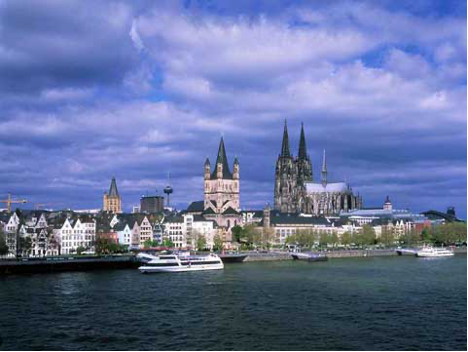
The Cologn Cathedral
On the morning of 19th of July we still toured within Germany, and we had been to Dortmund, Düsseldorf and on the afternoon we entered Holland. Seeing all varieties of cows on the meadow, some big trees on it, one rivulet after another with a distance between them, cows with full stomachs resting under the tree, thirsty ones going to the rivulet drinking. I imagined that the dairy industry of Netherland was sure to be well developed. Entering the capital city Amsterdam, we visited the seaport the Dutch were proud of, because the seafaring of Holland was developed well in the history. Early in 16th century, Netherlands took lead in the world because of its developed shipbuilding and navigation skills. It was also a bicycle kingdom and all the bicycles standing by the side of the street had a big lock on each of them, making the thief nail-biting. It was said the loss of the bicycle could not be filed as a case and the police did not help you to find it. The red-light district became a scenic spot. Curious, all of our team took a walk there. Riding in a boat on the canal passing the red district, we saw a callet in bikini performing to solicit business. The guide reminded us of not taking photos in case of making trouble. Back in the bus, some of us talked about it, saying that the hidden prostitutes were everywhere at home and some day in the future it would also become legal. The boss could apply for a business license and the government could levy tax, and check up the hygiene to prevent the social disease.
When you arrive at Holland, you are sure to pay a visit to the famous International Court of Justice in Hague, which was one of the six institutions and also the major judicial organization of the UN, founded on 3rd of April of 1946. We played a joke, saying to see Milosevic, who used to be the president of Jugoslavia Federation Republic (1997-2000) and lost control of Kosovo in 1999. On the 1st of April of 2001, he was arrested and the International War Crimes Tribunal indicted him as a war criminal the same year. He was the first chief of the state who was sent to the International War Court.
On the 20th of July we arrived in Belgium, getting to the capital city Brussels, where the headquarters of the EU and NATO were. The Brussels Grand Place was the central square of the city, surrounded by Gothic, Renaissance and Louis XIV architectures. The bell tower was 91 meters high and it was too hard for me to take a photo of the whole tower.
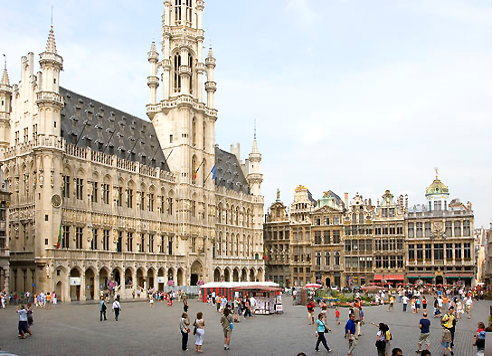
The Brussels Grand Place
The famous statue Manneken Pis was set up in 1619, which was only 50 centimeters tall. There were several versions about the story. The guide told us that when the Spanish occupant withdrew from Brussels they intended to explode the city. Luckily, the boy went out peeing, crushing out the fuse and saving the whole city. In memory of the little hero, the statue was erected.
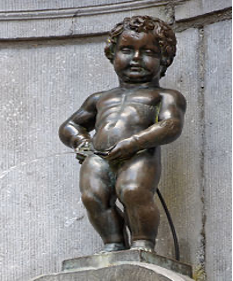
Manneken Pis
Atomium was set up as a symbolic monument of the World Fair/Expo in 1958. The design originated from the atom structure. Tubes connect the spheres along the 12 edges of the cube and all eight vertices to the center. They enclose escalators connecting the spheres containing exhibit halls and other public spaces. The top sphere provides a panoramic view of Brussels. Each sphere is 18 metres in diameter. As France has the Eiffel Tower so got Belgium its Atomium.
Belgium has an area of 30528 km2, somewhat smaller than our Hainan Province (35354 km2). It took us less time from Brussels to the France border than from the border to Paris. In the French Field, the wheat was being harvested. It was new for us that all the wheat straws were packed by the machine into round package, like wheels, so that they were convenient for the transportation. It never occurred that wheat straws were being burned everywhere after the harvest. Paris was a place we had been longing for because there were a lot of famous places of interest, namely, Notre-Dame of Paris, Louvre, Versailles Palace, Triumphal Arch, Eiffel Tower, Seine River and etc. We had been to all the places mentioned, and Louvre was the most impressive.

Louvre
During hundreds of years, sovereignty, like kings and emperors living in Louvre, had added to some bricks and tiles in different styles, making it more and more beautiful. Today, all the halls or rooms or corridors you went through or in were worth your enjoying just like the arts and works displayed. Louvre was indeed an art heaven, including the cultural relics from near east, Egypt, Greece and Rome, plus the Islamic artworks, sculptures, decoration arts, paintings, photos and drawings. A lot of world famous art works were housed here, such as, Venus de Milo, Mona Lisa drawn by Leonardo da Vinci, painter during the renaissance. To my astonishment, genuine paintings surrounding us, there were young beauties, strong males, athletic kids in nature, vivid and absolutely lifelike.
Versailles came into mind in my early teens when I studied history during the primary school. The First World War ended and the Allied (Entente) Powers won and the Central Powers were defeated. The former were having a negotiation, which lasted 6 months, signing an agreement, called Versailles Treaty. The Qingdao problem was not addressed between the Sino-Japan on the negotiation, and the May Fourth Movement broke out in Beijing. The delegation of China refused to sign on the treaty. The Palace of Versailles was built in a country village, some 20 kilometres southwest of the French capital. As a palace of France, it had a history of 107 years (from 1682-1789). In 1979 it was listed in the Catalogue of World Cultural and Natural Heritage.
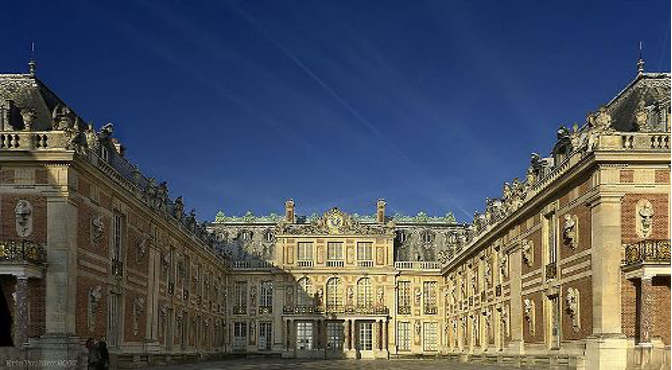
The Palace of Versailles
The French Triumphal Arch was erected in the memory of the Battle of Austerlitz, one of Napoleon's greatest victories, where the French Empire effectively crushed the Third Coalition. In commemoration of the great victories of French arms, it was decided to erect a triumphal arch in Paris on the model of the arches of ancient Rome in 1802 and was begun in February 1806, coming into being on July 29, 1836. On the inner walls of the arch are carved the names of 558 generals who participated in the battles of the Wars of the French Revolution and the Napoleonic Wars. It was the largest one of 100 plus triumphal arches in Europe. It was the center of Paris, from which 12 streets emanate into all directions, magnificent and glorious and it was an apotheosis of the city design in Europe. We were walking in the Avenue des Champs-Élysées which was world-famous and went to the Triumphal Arch standing on the star-styled Charles de Gaulle Square. On the shorter sides of the four supporting columns, are the names of the major victorious battles of the Napoleonic Wars. We had a close look at them.
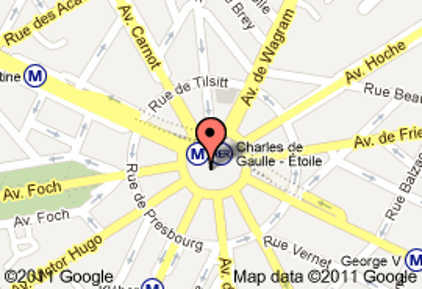
12 streets emanate into all directions

The French Triumphal Arch
The Eiffel Tower is a puddle iron lattice tower located on the Champ de Mars in Paris. Built in 1889, it has become both a global icon of France and one of the most recognizable structures in the world. The tower is the tallest building in Paris and the most-visited paid monument in the world; millions of people ascend it every year. Named after its designer, engineer Gustave Eiffel, the tower was built as the entrance arch to the 1889 World's Fair, which has become the most prominent symbol of both Paris and France. The tower stands 324 meters tall and has three levels for visitors. We were elevated to the third level and the whole Paris was in our eyes.
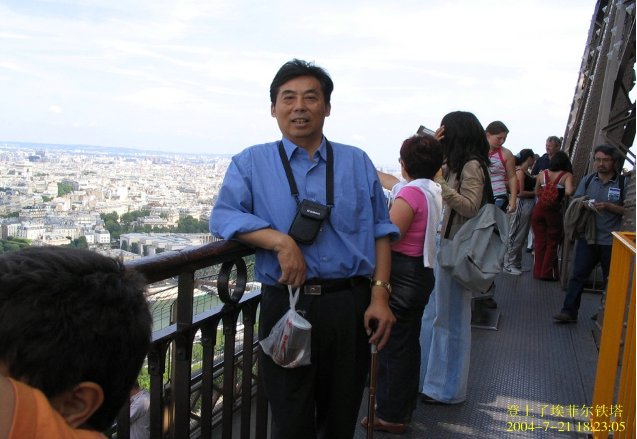
On the Third Level of the Eiffel Tower
July 22, 2004 was the sixth of the sixth month of the Chinese year, Meilan’s 61th birthday according to the Chinese tradition (60thaccording to the solar year). We didn’t dare to celebrate her birthday generously in Paris, after all, one euro equaling 10 RMB, which we were not tolerant of. Even if I was determined to be generous, it would make her unhappy rather than happy. However, we decided to go to a Chinese restaurant to have two bowls of noodle, which had a symbolic value of long life. Each bowl of noodle cost €7.5, two bowls €15, equaled ¥150,which cost at most ¥10 in Xuzhou. It made us grind our teeth for years as if the hate could not disappear in our mind. In the Western Europe if you joined the tour group and spent the night in a hotel, the breakfast was free and for lunch and supper nothing was provided. In order to spend less, we got ready some bread, cucumbers and tomatoes. Plus, we brought some soup bases and convenient noodles. We regarded the eatery as a river we could not cross.
On the 23rd of July we entered Luxemburg from France. In the primary school when studying geography, I got the impression that Luxemburg was one of the smallest countries in the world. Actually it had a population of 500,000, and an area of 2586.3 km2, almost equal to a large county of Jiangsu, e.g. Sheyang County, which had 2776 km2 and 960,000 people. There were 194 sovereignties in the world and Luxemburg was ranked as the 176th. However, GDP per capita it had been ranked No. 1 for years. In April of 2004, the World Bank publicized that GPD per capita of Luxemburg was $43,940. Small the country was, a lot of names began with “grand” f.g. Grand Duchy of Luxembourg, Grand Canyon, Palais Grand-Ducal and etc. A bit of an exaggeration, one gun of the engine, the bus could reach the town Trier of Germany from Luxemburg.
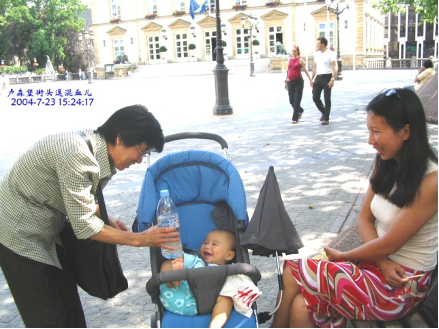
Playing with a hybrid baby in Luxembourg
Trier was Karl Marx’s home town and there was a museum of him. In Germany, Marx was one of the greatest thinkers and now there were few worshippers. It was said that most visitors were from China. The ticket cost €2 and few of us entered it. We didn’t visit it either and only had taken a photo in front of the gate.
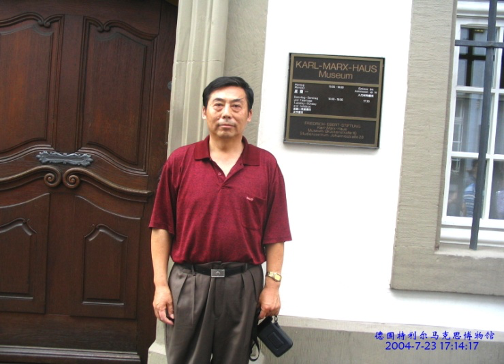
Karl-Marx-House Museum
On the morning of 24th of July we got to Heidelberg, which is located between Frankfurt and Stuttgart, in the south-west of the country, by the River of Neckar, which flows here in an east-west direction. On the north bank of the river, the mountain Heiligenberg (445 m) rises. The River Neckar leads to the River Rhine approximately 22 kilometers north-westerly in Mannheim. On the Heiligenberg there lived rich people, overlooking Neckar River, indeed a land of high geomantic quality. We enjoyed garden houses one after another. Heidelberg had one of the most ancient education institutions, Heidelberg University, where studied Georg Wilhelm Friedrich Hegel, a German philosopher, one of the creators of German Idealism and Karl Drais a German inventor and invented the Laufmaschine (“running machine, ie. Bicycle”). Drais also invented the earliest typewriter with a keyboard in 1821.
The visit to Heidelberg was ended and the bus sent all the members northward. We got off at Hannover and were transported to Berlin with the other two persons, who began their tour from Berlin. From Hannover to Berlin there were two time zones, 250 km. When we got there it was past 9 o’clock p.m. Because of high latitude, the sun was still in the western sky. Xiaoxiao Tong, who came to meet us, saw us at once. Tong was from Suining County of Xuzhou, who graduated from Nanjing University of the Arts and taught in Xuzhou Institute of Architectural Technology. She made her mind to study in Germany and received German education beginning from ABCD in my home. She arranged for us to live in an apartment by a Chinese who had gone to China. After almost one and a half hours of cleaning could we lie down on the bed. The next day we went to a supermarket, buying some pork, vegetables and seasonings and did cooking ourselves in the kitchen we stayed. Tong came to us with her boy friend and we had a delicious meal, much cheaper than that of the eatery.
East Berlin used to be the capital of East Germany. When we studied German in Nanjing University we used the teaching course of Karl Marx University of East Berlin. At that time, we could not understand how the people in West Berlin lived because it was surrounded by East Germany, its enemy. In 1948, West Berlin was blockaded and in order to supply 2,500,000 people with the living material, 5 layers of airplanes flew from Frankfurt, transporting all kinds of materials to West Berlin, the quantity larger than that carried on the land before the blockade. In May of 1949, the two sides reached an agreement and the Soviet Union gave in, the blockade ending on 12th of May. Three Berlin crises made Berlin Wall come into being, which was 169.5 km long, made of cement slab, cement wall and wire netting etc. The Berlin Wall fell down in Nov. of 1989. When we got to Berlin in July of 2004, no trail could be seen anywhere.
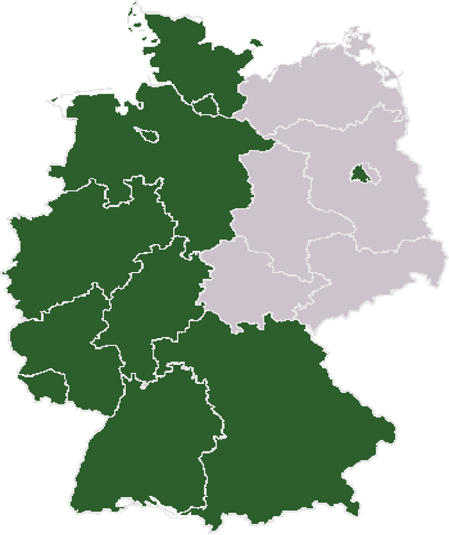
Green part belonged to West Germany and white to East Germany
In the city of Berlin you could not see any skyscrapers and it seemed to me an ordinary city. Wandering in some stores, we could read so many public signs in German, satisfying our desire to have a look at Berlin, which we thought long ago and didn’t dare to think it could be turned into reality.
On the early morning of the 27th, July, we got on a bus direct to Frankfurt, from the northeast to southwest, 594 kilometers, as far as from Xuzhou to Jinyu, my hometown. We passed by several cities: Potsdam, Dessau, Erfurt, Eisennach and Ban Hersfeld. In the afternoon we got to Frankfurt and Xingliang Wang picked us up and arranged for us to stay in the same hotel as the first time. 28th of July saw us flying from Frankfurt Airport to Munich, where we waited for three hours and connected a flight from Paris to Beijing.
Our plane seat neighbors were a pair of young lovers studying in France. By talking with them, we learned that just like a lot of Chinese students in Germany, they all experienced the distress of length of schooling. The German and French primary school had 7 years (before year one, there was a prep year). The Chinese students had to make up that year, which meant only when you finished one year in China’s college or university, could you begin to read in the first year in institutions for higher learning. Plus, you had to learn French or German, at least one year. In France and German there was no degree of bachelor. As a result, you had to win the master’s degree if you wanted one. The period of Grundstudium (fundamental) of the master’s degree lasted 6 semesters and Hauptstudium (professionals) 4 to 8 semester. Altogether, it would last at least 7 years and even 9 or 10 years. The agency only told you that you didn’t need to pay the tuition in Germany and France. The living cost was surprisingly high and the length of schooling was intolerable. Don’t think of studying abroad as a perfect thing. Get ready to deal with a lot of troubling things.
On 29th of July in 2004 we arrived at Beijing smoothly, completing the first journey to foreign countries.
Realizing the cherished desire, I had a wonderful feeling. In our 1964 class of studying German, there were 64 students. Finally, we entered the team who had been to Germany, still being minority. As long as I heard a certain man or lady in our 1964 class went to Germany, a foul gas appeared in my stomach and I had to restrain myself out of reason. In the final analysis, I had been thinking that I had studied German well but could not make use of it. Accordingly, I had a feeling of being compelled and being unable to be released. Travelling in Western Europe, I discovered that English was much more useful than German. Wherever you went you could find people to communicate, finding it very convenient. If you could only speak German, you could only communicate in Germany, Austria and part of Switzerland. My English had reached the level of communication, which satisfied me very much. Scram, German! All the regrets having accumulated in my mind disappeared all of a sudden. This time I spent my royalty doing a tour of Western Europe, which was completely different than professional charges. It could not come to me to spend school’s money making tour abroad. If it had happened to me (absolutely unlikely to bring wife with me), I should have been ready to be attacked by envy arrows. Spending our own money, we had a completely free journey. No task imposed upon me by the superior, no worry about other’s jealousy. It was “dream or wish coming true”, which you could receive during the festival on the New Year’s or Christmas card. According to the task of composing two TOEIC exercise books, I took a lot of photos and could write them whole-heartedly at home now. The two books “TOEIC Reading Comprehension Exercises” and “TOEIC Listening Comprehension Exercise” were published in the publishing house of Beijing Language and Culture University in March of 2005, with one-time author's remuneration RMB 12,000, which provided money for the next travel. Since the division of our department and my thigh bone fracture, a lot of unlucky raids were conducted upon me. The tour in Western Europe washed me out like a clean waterfall, getting away with all the evils and unlucky influences. Anger and frustration disappeared like clouds, making me completely relaxed. I could not help thinking of what Tianxiu Miao said, a ministry councilor from Yangzhou, in the book of “Jin Ping Mei”: “A great man born between the heaven and the land, using a mulberry wood as a bow and straw as an arrow, indicating a big ambition to tour the whole country and do sightseeing. Without doing that, dying under the window of one’s own house is of no benefit.” Since then an ambition was growing in my mind that reading a lot, making trip further and writing continuously was what I went in for. Reading famous books as many as possible and enjoying beautiful scenery as much as possible and writing what I see, my feeling and thought are sure to be the utmost happiness of my life.
Aug 2 of 2011 in Xuzhou
Proofreading on March 28 of 2012, in Chicago
Second proofreading on Dec. 29, 2018
Uploading on Aug. 7 of 2023 in Xuzhou



